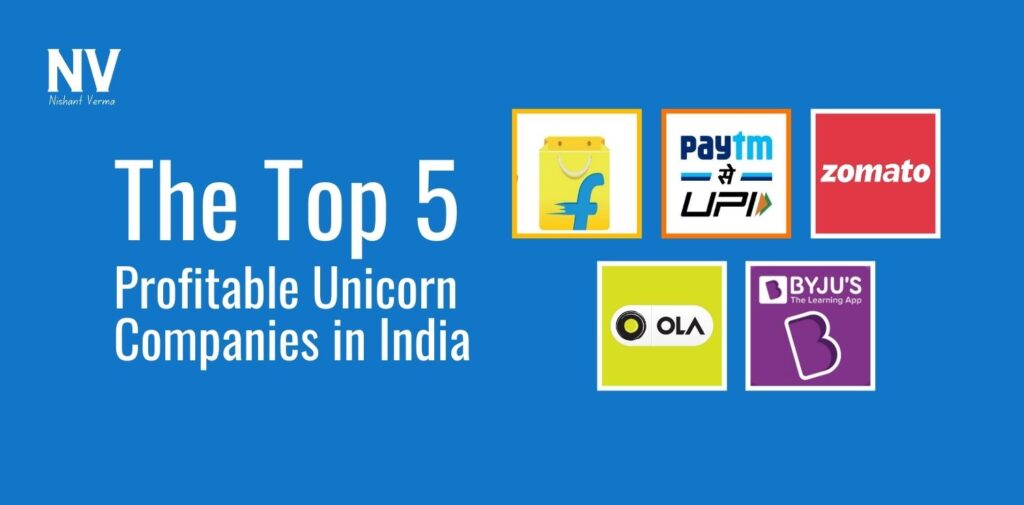Unicorn companies are the stars of the business world. These are startups valued at over $1 billion. In India, several unicorns are not only successful but also highly profitable. In this article, we will explore the top 5 most profitable unicorn companies in India. We will explain what these companies do, how they make money, and why they are so successful. So, let’s dive in and discover the secrets behind their profitability.
Flipkart – Revolutionizing E-Commerce
Flipkart is India’s leading e-commerce company. Founded in 2007 by Sachin Bansal and Binny Bansal, it started as an online bookstore and has since evolved into a one-stop shop for everything you might need. The company is now valued at over $37 billion.
- Business Model: Flipkart connects buyers and sellers, allowing people to shop for a wide range of products online. It makes money by charging a commission to sellers for each sale made on its platform. Additionally, they have a subscription service called “Flipkart Plus,” which offers exclusive benefits to its members for a monthly fee.
- Profitability: Flipkart’s profitability comes from its huge customer base and efficient logistics. It uses a technology-driven approach to reduce costs and increase sales. The company also benefited from the surge in online shopping during the COVID-19 pandemic.

Paytm – India’s Digital Payment Pioneer
Paytm, short for “Pay Through Mobile,” is a digital payments and financial services company founded by Vijay Shekhar Sharma in 2010. The company has become one of India’s most valuable startups, with a valuation of over $16 billion.
- Business Model: Paytm allows users to make payments, recharge their mobile phones, pay bills, book flights, and even invest in mutual funds, among other services. They make money by charging fees for these transactions and offering financial products like loans and insurance.
- Profitability: The rapid adoption of digital payments in India drives Paytm’s profitability. The company has also expanded into financial services, which contribute significantly to its revenue. The government’s push for a cashless economy has further boosted Paytm’s growth.

Ola – Transforming Transportation
Ola, founded by Bhavish Aggarwal and Ankit Bhati in 2010, is India’s largest ride-sharing company, valued at over $6 billion.
- Business Model: Ola connects riders with drivers through its app. It makes money by taking a commission from each ride, and it offers various services like Ola Auto, Ola Bike, and Ola Rentals, expanding its revenue streams.
- Profitability: Ola’s profitability stems from its widespread user base and constant innovation. It’s adapted to local markets, introduced electric vehicles, and ventured into food delivery with Ola Foods. The company’s commitment to sustainability and diversification has been key to its success.

Byju’s – Revolutionizing Education
Byju’s, founded by Byju Raveendran in 2008, is an edtech (education technology) company with a valuation of over $16.5 billion.
- Business Model: Byju offers online learning programs for students from K-12 to competitive exams. They earn revenue through subscription fees and selling courses and study materials.
- Profitability: Byju’s profitability is driven by the growing demand for online education, especially during the COVID-19 pandemic. The company’s engaging and personalized learning content has attracted millions of students, making it a leader in the Indian ed-tech space.

Zomato – Satisfying Your Food Cravings
Zomato, founded by Deepinder Goyal and Pankaj Chaddah in 2008, is an online food delivery and restaurant discovery platform. It’s valued at over $9 billion.
- Business Model: Zomato allows users to order food from restaurants and also provides information about dining establishments. They make money through delivery fees, advertising for restaurants, and subscription services like Zomato Pro.
- Profitability: Zomato’s profitability is driven by the growing trend of food delivery and dining out in India. The company expanded into multiple countries, creating a global presence. Their innovative features, like contactless dining and Zomato Gold, have attracted a loyal customer base.

Conclusion:
In this article, we’ve explored the top 5 most profitable unicorn companies in India. These companies have not only disrupted traditional industries but have also shown remarkable profitability. Their business models, innovative approaches, and adaptability to market trends have played a crucial role in their success.
These unicorns are not just valuable for their investors; they also contribute significantly to the Indian economy by creating jobs and driving economic growth. Their stories serve as an inspiration for aspiring entrepreneurs and demonstrate the immense potential of the Indian startup ecosystem.
As these companies continue to grow and evolve, it will be interesting to see how they maintain their profitability and what innovations they bring to the market. The Indian business landscape is continually changing, and these unicorns are at the forefront of that transformation.




